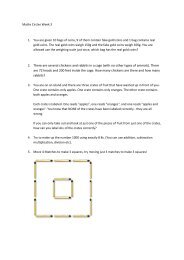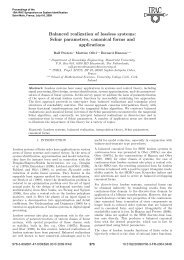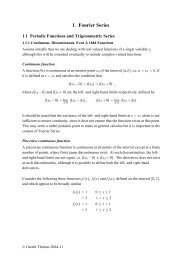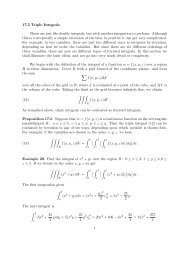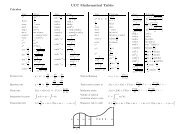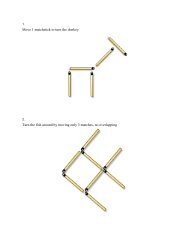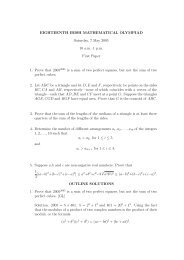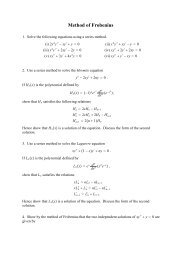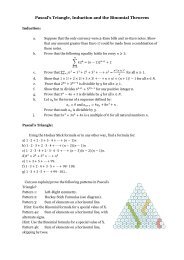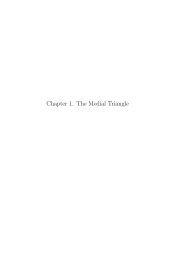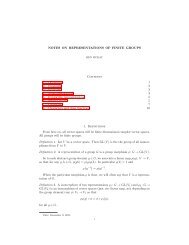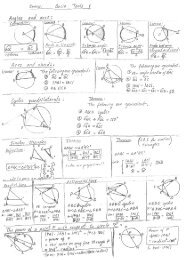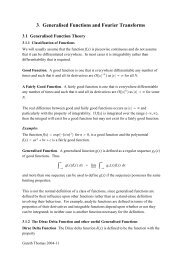1. A mail-order computer business has six telephone lines. Let X ...
1. A mail-order computer business has six telephone lines. Let X ...
1. A mail-order computer business has six telephone lines. Let X ...
You also want an ePaper? Increase the reach of your titles
YUMPU automatically turns print PDFs into web optimized ePapers that Google loves.
7. Customers at a gas station select either regular (A), premium (B), or<br />
diesel fuel (C). Assume that successive customers make independent<br />
choices, with P (A) = 0.3, P (B) = 0.2, and P (C) = 0.5.<br />
(a) Among the next 100 customers, what are the mean and variance<br />
of the number who select regular fuel? Explain your reasoning.<br />
Ans The no. who select regular do so with P (A) = 0.3, therefore<br />
who do not select regular do so with 1 − P (A) = P (B) + P (C) =<br />
0.7. Define Xi = 1 if i-th customer chooses regular, 0 otherwise.<br />
This is therefore a Bernoulli r.v. with parameter, p = 0.3.<br />
Therefore the total no. of customers among the 100 customers<br />
who choose regular, is a Binomial r.v. = Xi. Therefore the<br />
mean and variance are 100 × 0.3 = 30 and 100 × 0.3 × 0.7 = 2<strong>1.</strong><br />
(b) Answer part (a) for the number among the 100 who select a<br />
nondiesel fuel.<br />
8. An airport limousine can accommodate up to four passengers on any<br />
one trip. The company will accept a maximum of <strong>six</strong> reservations<br />
for a trip, and a passenger must have a reservation. From previous<br />
records, 20% of all those making reservations do not appear for the<br />
trip. Answer the following questions, assuming independence wherever<br />
appropriate.<br />
(a) If <strong>six</strong> reservations are made, what is the probability that at least<br />
one individual with a reservation cannot be accommodated on<br />
the trip?<br />
Ans At least one individual with a reservation cannot be accommodated<br />
on the trip is equivalent to 5 or 6 individuals turning<br />
up. This is a Binomial r.v., as can be seen by defining Xi = 1<br />
if an individual turns up, and taking the total no. turning up as<br />
Y = <br />
i Xi. We now have to find, P [Y = 5] + P [Y = 6].<br />
6<br />
5<br />
<br />
0.8 5 (1 − 0.8) 6−5 +<br />
6<br />
6<br />
<br />
0.8 6 (1 − 0.8) 6−6<br />
= 0.393216 + 0.262144 = 0.65536<br />
(b) If <strong>six</strong> reservations are made, what is the expected number of<br />
available places when the limousine departs?<br />
Ans The available no. of places Z = max[4 − Y, 0]. Therefore,<br />
P [Z = k] = P [Y = 4 − k], k = 1, . . . , 4, and P [Z = 0] = P [Y =<br />
4] + P [Y = 5] + P [Y = 6]. The expected value is therefore,<br />
<strong>1.</strong>P [Y = 3] + 2.P [Y = 2] + 3.P [Y = 1] + 4.P [Y = 0]<br />
= <strong>1.</strong>P [Y = 3] + 2.P [Y = 2] + 3.P [Y = 1] + 4.P [Y = 0]<br />
6



